Summary of a Satisfactory Moral Theory
VerifiedAdded on 2022/11/13
|7
|1466
|121
AI Summary
This paper describes the values and ethics behind morality and how there is reason behind every moral formed by human beings. It analyzes how moral theories are reasonable and satisfactory.
Contribute Materials
Your contribution can guide someone’s learning journey. Share your
documents today.
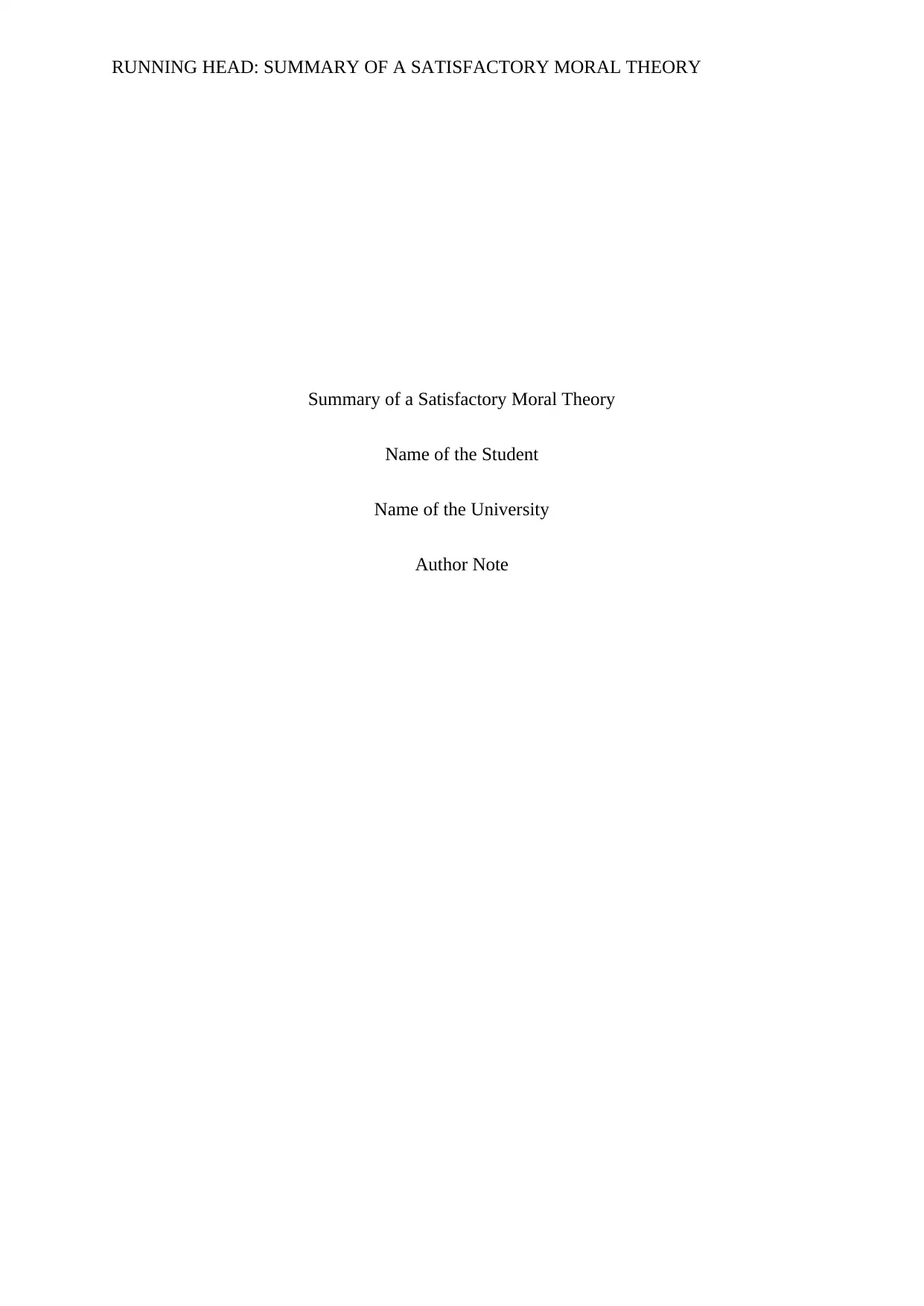
RUNNING HEAD: SUMMARY OF A SATISFACTORY MORAL THEORY
Summary of a Satisfactory Moral Theory
Name of the Student
Name of the University
Author Note
Summary of a Satisfactory Moral Theory
Name of the Student
Name of the University
Author Note
Secure Best Marks with AI Grader
Need help grading? Try our AI Grader for instant feedback on your assignments.
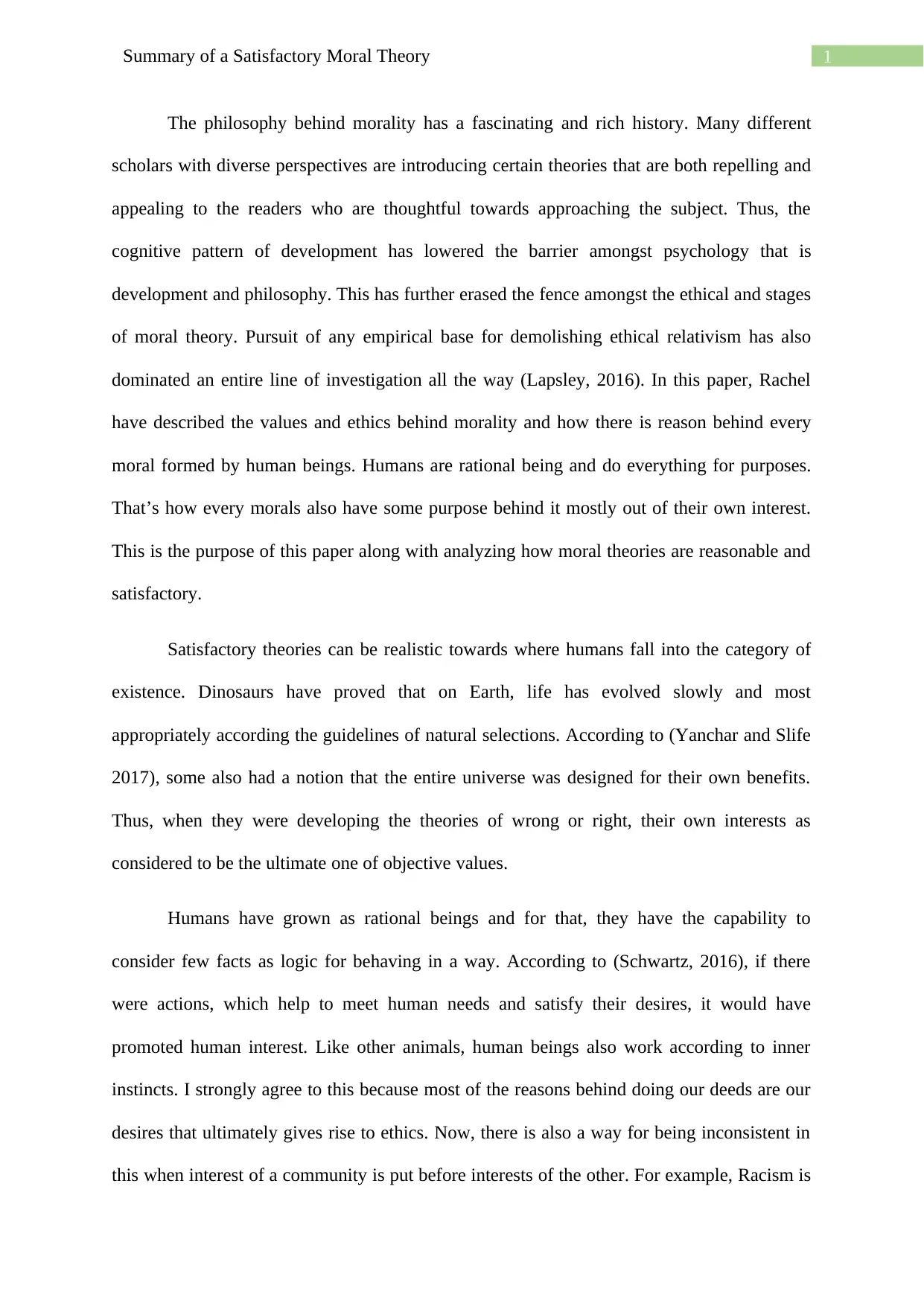
1Summary of a Satisfactory Moral Theory
The philosophy behind morality has a fascinating and rich history. Many different
scholars with diverse perspectives are introducing certain theories that are both repelling and
appealing to the readers who are thoughtful towards approaching the subject. Thus, the
cognitive pattern of development has lowered the barrier amongst psychology that is
development and philosophy. This has further erased the fence amongst the ethical and stages
of moral theory. Pursuit of any empirical base for demolishing ethical relativism has also
dominated an entire line of investigation all the way (Lapsley, 2016). In this paper, Rachel
have described the values and ethics behind morality and how there is reason behind every
moral formed by human beings. Humans are rational being and do everything for purposes.
That’s how every morals also have some purpose behind it mostly out of their own interest.
This is the purpose of this paper along with analyzing how moral theories are reasonable and
satisfactory.
Satisfactory theories can be realistic towards where humans fall into the category of
existence. Dinosaurs have proved that on Earth, life has evolved slowly and most
appropriately according the guidelines of natural selections. According to (Yanchar and Slife
2017), some also had a notion that the entire universe was designed for their own benefits.
Thus, when they were developing the theories of wrong or right, their own interests as
considered to be the ultimate one of objective values.
Humans have grown as rational beings and for that, they have the capability to
consider few facts as logic for behaving in a way. According to (Schwartz, 2016), if there
were actions, which help to meet human needs and satisfy their desires, it would have
promoted human interest. Like other animals, human beings also work according to inner
instincts. I strongly agree to this because most of the reasons behind doing our deeds are our
desires that ultimately gives rise to ethics. Now, there is also a way for being inconsistent in
this when interest of a community is put before interests of the other. For example, Racism is
The philosophy behind morality has a fascinating and rich history. Many different
scholars with diverse perspectives are introducing certain theories that are both repelling and
appealing to the readers who are thoughtful towards approaching the subject. Thus, the
cognitive pattern of development has lowered the barrier amongst psychology that is
development and philosophy. This has further erased the fence amongst the ethical and stages
of moral theory. Pursuit of any empirical base for demolishing ethical relativism has also
dominated an entire line of investigation all the way (Lapsley, 2016). In this paper, Rachel
have described the values and ethics behind morality and how there is reason behind every
moral formed by human beings. Humans are rational being and do everything for purposes.
That’s how every morals also have some purpose behind it mostly out of their own interest.
This is the purpose of this paper along with analyzing how moral theories are reasonable and
satisfactory.
Satisfactory theories can be realistic towards where humans fall into the category of
existence. Dinosaurs have proved that on Earth, life has evolved slowly and most
appropriately according the guidelines of natural selections. According to (Yanchar and Slife
2017), some also had a notion that the entire universe was designed for their own benefits.
Thus, when they were developing the theories of wrong or right, their own interests as
considered to be the ultimate one of objective values.
Humans have grown as rational beings and for that, they have the capability to
consider few facts as logic for behaving in a way. According to (Schwartz, 2016), if there
were actions, which help to meet human needs and satisfy their desires, it would have
promoted human interest. Like other animals, human beings also work according to inner
instincts. I strongly agree to this because most of the reasons behind doing our deeds are our
desires that ultimately gives rise to ethics. Now, there is also a way for being inconsistent in
this when interest of a community is put before interests of the other. For example, Racism is
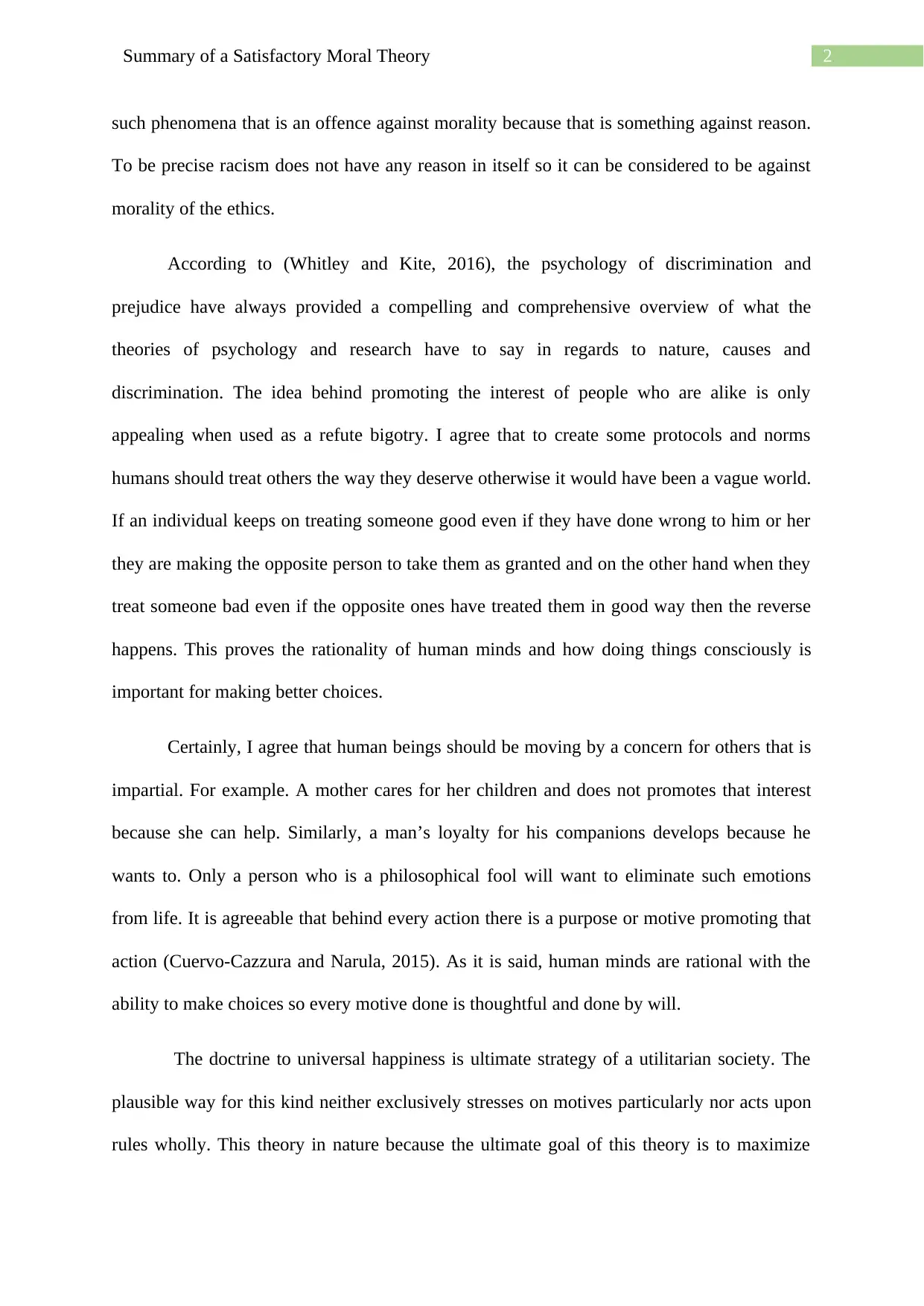
2Summary of a Satisfactory Moral Theory
such phenomena that is an offence against morality because that is something against reason.
To be precise racism does not have any reason in itself so it can be considered to be against
morality of the ethics.
According to (Whitley and Kite, 2016), the psychology of discrimination and
prejudice have always provided a compelling and comprehensive overview of what the
theories of psychology and research have to say in regards to nature, causes and
discrimination. The idea behind promoting the interest of people who are alike is only
appealing when used as a refute bigotry. I agree that to create some protocols and norms
humans should treat others the way they deserve otherwise it would have been a vague world.
If an individual keeps on treating someone good even if they have done wrong to him or her
they are making the opposite person to take them as granted and on the other hand when they
treat someone bad even if the opposite ones have treated them in good way then the reverse
happens. This proves the rationality of human minds and how doing things consciously is
important for making better choices.
Certainly, I agree that human beings should be moving by a concern for others that is
impartial. For example. A mother cares for her children and does not promotes that interest
because she can help. Similarly, a man’s loyalty for his companions develops because he
wants to. Only a person who is a philosophical fool will want to eliminate such emotions
from life. It is agreeable that behind every action there is a purpose or motive promoting that
action (Cuervo-Cazzura and Narula, 2015). As it is said, human minds are rational with the
ability to make choices so every motive done is thoughtful and done by will.
The doctrine to universal happiness is ultimate strategy of a utilitarian society. The
plausible way for this kind neither exclusively stresses on motives particularly nor acts upon
rules wholly. This theory in nature because the ultimate goal of this theory is to maximize
such phenomena that is an offence against morality because that is something against reason.
To be precise racism does not have any reason in itself so it can be considered to be against
morality of the ethics.
According to (Whitley and Kite, 2016), the psychology of discrimination and
prejudice have always provided a compelling and comprehensive overview of what the
theories of psychology and research have to say in regards to nature, causes and
discrimination. The idea behind promoting the interest of people who are alike is only
appealing when used as a refute bigotry. I agree that to create some protocols and norms
humans should treat others the way they deserve otherwise it would have been a vague world.
If an individual keeps on treating someone good even if they have done wrong to him or her
they are making the opposite person to take them as granted and on the other hand when they
treat someone bad even if the opposite ones have treated them in good way then the reverse
happens. This proves the rationality of human minds and how doing things consciously is
important for making better choices.
Certainly, I agree that human beings should be moving by a concern for others that is
impartial. For example. A mother cares for her children and does not promotes that interest
because she can help. Similarly, a man’s loyalty for his companions develops because he
wants to. Only a person who is a philosophical fool will want to eliminate such emotions
from life. It is agreeable that behind every action there is a purpose or motive promoting that
action (Cuervo-Cazzura and Narula, 2015). As it is said, human minds are rational with the
ability to make choices so every motive done is thoughtful and done by will.
The doctrine to universal happiness is ultimate strategy of a utilitarian society. The
plausible way for this kind neither exclusively stresses on motives particularly nor acts upon
rules wholly. This theory in nature because the ultimate goal of this theory is to maximize
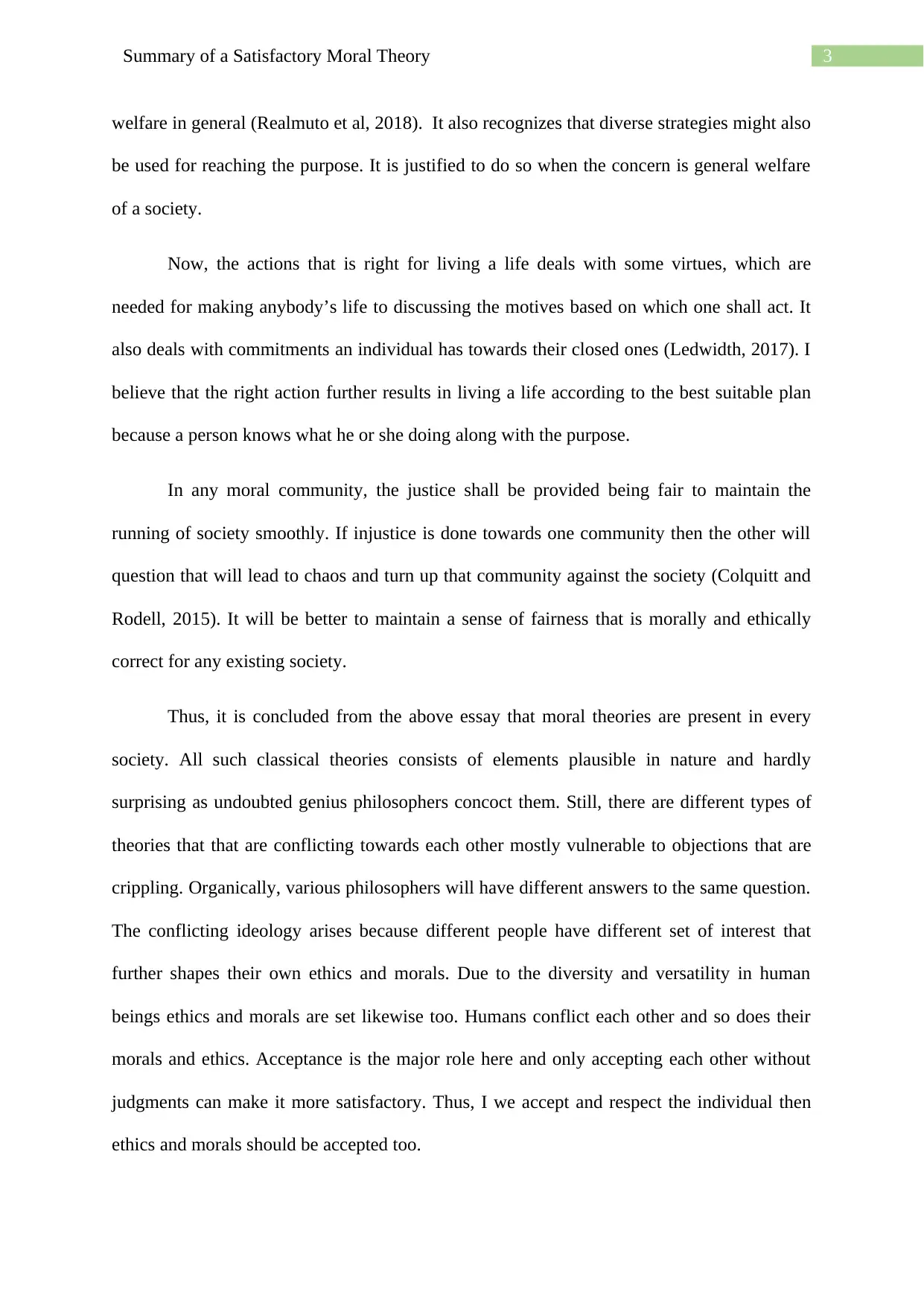
3Summary of a Satisfactory Moral Theory
welfare in general (Realmuto et al, 2018). It also recognizes that diverse strategies might also
be used for reaching the purpose. It is justified to do so when the concern is general welfare
of a society.
Now, the actions that is right for living a life deals with some virtues, which are
needed for making anybody’s life to discussing the motives based on which one shall act. It
also deals with commitments an individual has towards their closed ones (Ledwidth, 2017). I
believe that the right action further results in living a life according to the best suitable plan
because a person knows what he or she doing along with the purpose.
In any moral community, the justice shall be provided being fair to maintain the
running of society smoothly. If injustice is done towards one community then the other will
question that will lead to chaos and turn up that community against the society (Colquitt and
Rodell, 2015). It will be better to maintain a sense of fairness that is morally and ethically
correct for any existing society.
Thus, it is concluded from the above essay that moral theories are present in every
society. All such classical theories consists of elements plausible in nature and hardly
surprising as undoubted genius philosophers concoct them. Still, there are different types of
theories that that are conflicting towards each other mostly vulnerable to objections that are
crippling. Organically, various philosophers will have different answers to the same question.
The conflicting ideology arises because different people have different set of interest that
further shapes their own ethics and morals. Due to the diversity and versatility in human
beings ethics and morals are set likewise too. Humans conflict each other and so does their
morals and ethics. Acceptance is the major role here and only accepting each other without
judgments can make it more satisfactory. Thus, I we accept and respect the individual then
ethics and morals should be accepted too.
welfare in general (Realmuto et al, 2018). It also recognizes that diverse strategies might also
be used for reaching the purpose. It is justified to do so when the concern is general welfare
of a society.
Now, the actions that is right for living a life deals with some virtues, which are
needed for making anybody’s life to discussing the motives based on which one shall act. It
also deals with commitments an individual has towards their closed ones (Ledwidth, 2017). I
believe that the right action further results in living a life according to the best suitable plan
because a person knows what he or she doing along with the purpose.
In any moral community, the justice shall be provided being fair to maintain the
running of society smoothly. If injustice is done towards one community then the other will
question that will lead to chaos and turn up that community against the society (Colquitt and
Rodell, 2015). It will be better to maintain a sense of fairness that is morally and ethically
correct for any existing society.
Thus, it is concluded from the above essay that moral theories are present in every
society. All such classical theories consists of elements plausible in nature and hardly
surprising as undoubted genius philosophers concoct them. Still, there are different types of
theories that that are conflicting towards each other mostly vulnerable to objections that are
crippling. Organically, various philosophers will have different answers to the same question.
The conflicting ideology arises because different people have different set of interest that
further shapes their own ethics and morals. Due to the diversity and versatility in human
beings ethics and morals are set likewise too. Humans conflict each other and so does their
morals and ethics. Acceptance is the major role here and only accepting each other without
judgments can make it more satisfactory. Thus, I we accept and respect the individual then
ethics and morals should be accepted too.
Secure Best Marks with AI Grader
Need help grading? Try our AI Grader for instant feedback on your assignments.

4Summary of a Satisfactory Moral Theory
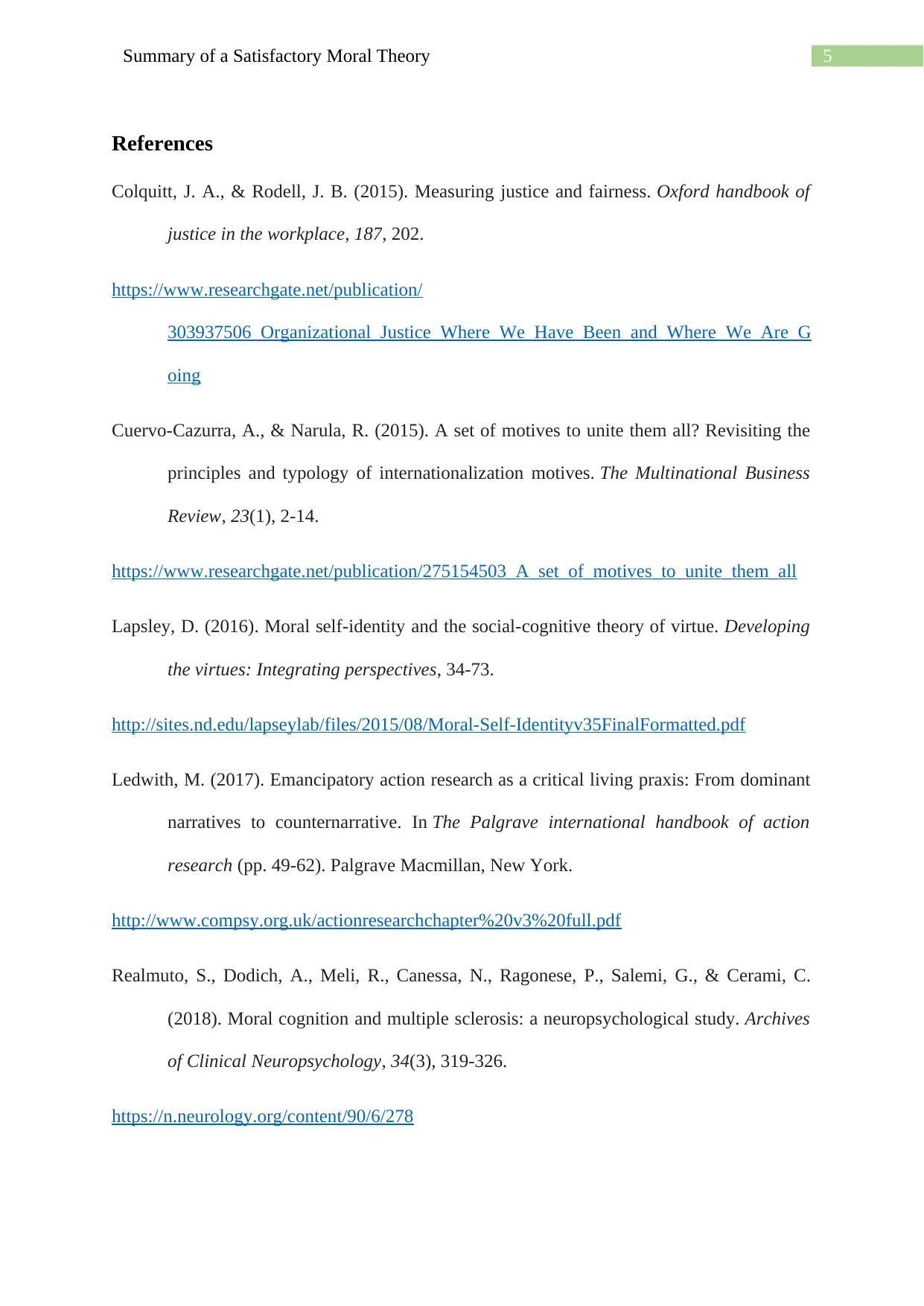
5Summary of a Satisfactory Moral Theory
References
Colquitt, J. A., & Rodell, J. B. (2015). Measuring justice and fairness. Oxford handbook of
justice in the workplace, 187, 202.
https://www.researchgate.net/publication/
303937506_Organizational_Justice_Where_We_Have_Been_and_Where_We_Are_G
oing
Cuervo-Cazurra, A., & Narula, R. (2015). A set of motives to unite them all? Revisiting the
principles and typology of internationalization motives. The Multinational Business
Review, 23(1), 2-14.
https://www.researchgate.net/publication/275154503_A_set_of_motives_to_unite_them_all
Lapsley, D. (2016). Moral self-identity and the social-cognitive theory of virtue. Developing
the virtues: Integrating perspectives, 34-73.
http://sites.nd.edu/lapseylab/files/2015/08/Moral-Self-Identityv35FinalFormatted.pdf
Ledwith, M. (2017). Emancipatory action research as a critical living praxis: From dominant
narratives to counternarrative. In The Palgrave international handbook of action
research (pp. 49-62). Palgrave Macmillan, New York.
http://www.compsy.org.uk/actionresearchchapter%20v3%20full.pdf
Realmuto, S., Dodich, A., Meli, R., Canessa, N., Ragonese, P., Salemi, G., & Cerami, C.
(2018). Moral cognition and multiple sclerosis: a neuropsychological study. Archives
of Clinical Neuropsychology, 34(3), 319-326.
https://n.neurology.org/content/90/6/278
References
Colquitt, J. A., & Rodell, J. B. (2015). Measuring justice and fairness. Oxford handbook of
justice in the workplace, 187, 202.
https://www.researchgate.net/publication/
303937506_Organizational_Justice_Where_We_Have_Been_and_Where_We_Are_G
oing
Cuervo-Cazurra, A., & Narula, R. (2015). A set of motives to unite them all? Revisiting the
principles and typology of internationalization motives. The Multinational Business
Review, 23(1), 2-14.
https://www.researchgate.net/publication/275154503_A_set_of_motives_to_unite_them_all
Lapsley, D. (2016). Moral self-identity and the social-cognitive theory of virtue. Developing
the virtues: Integrating perspectives, 34-73.
http://sites.nd.edu/lapseylab/files/2015/08/Moral-Self-Identityv35FinalFormatted.pdf
Ledwith, M. (2017). Emancipatory action research as a critical living praxis: From dominant
narratives to counternarrative. In The Palgrave international handbook of action
research (pp. 49-62). Palgrave Macmillan, New York.
http://www.compsy.org.uk/actionresearchchapter%20v3%20full.pdf
Realmuto, S., Dodich, A., Meli, R., Canessa, N., Ragonese, P., Salemi, G., & Cerami, C.
(2018). Moral cognition and multiple sclerosis: a neuropsychological study. Archives
of Clinical Neuropsychology, 34(3), 319-326.
https://n.neurology.org/content/90/6/278
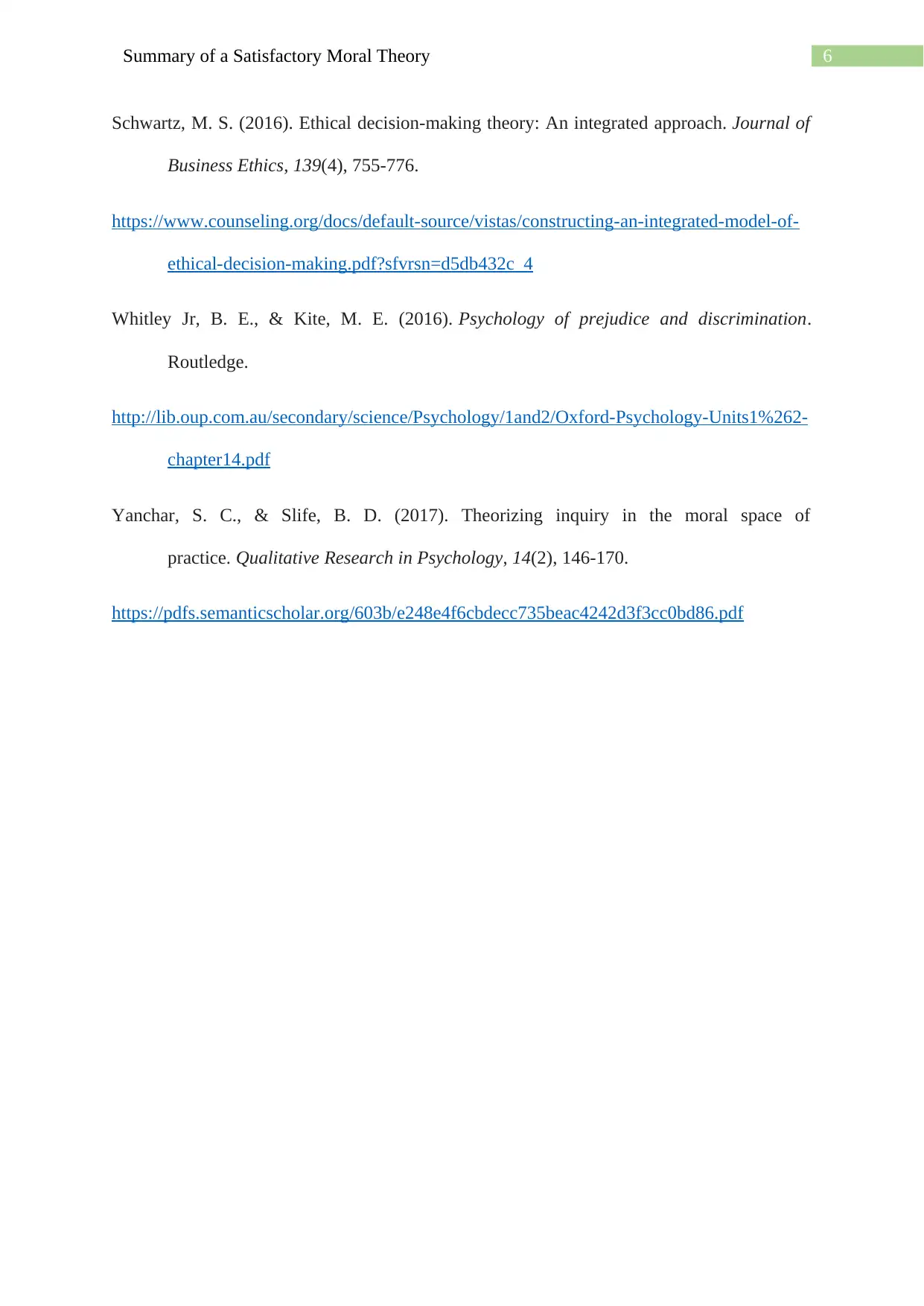
6Summary of a Satisfactory Moral Theory
Schwartz, M. S. (2016). Ethical decision-making theory: An integrated approach. Journal of
Business Ethics, 139(4), 755-776.
https://www.counseling.org/docs/default-source/vistas/constructing-an-integrated-model-of-
ethical-decision-making.pdf?sfvrsn=d5db432c_4
Whitley Jr, B. E., & Kite, M. E. (2016). Psychology of prejudice and discrimination.
Routledge.
http://lib.oup.com.au/secondary/science/Psychology/1and2/Oxford-Psychology-Units1%262-
chapter14.pdf
Yanchar, S. C., & Slife, B. D. (2017). Theorizing inquiry in the moral space of
practice. Qualitative Research in Psychology, 14(2), 146-170.
https://pdfs.semanticscholar.org/603b/e248e4f6cbdecc735beac4242d3f3cc0bd86.pdf
Schwartz, M. S. (2016). Ethical decision-making theory: An integrated approach. Journal of
Business Ethics, 139(4), 755-776.
https://www.counseling.org/docs/default-source/vistas/constructing-an-integrated-model-of-
ethical-decision-making.pdf?sfvrsn=d5db432c_4
Whitley Jr, B. E., & Kite, M. E. (2016). Psychology of prejudice and discrimination.
Routledge.
http://lib.oup.com.au/secondary/science/Psychology/1and2/Oxford-Psychology-Units1%262-
chapter14.pdf
Yanchar, S. C., & Slife, B. D. (2017). Theorizing inquiry in the moral space of
practice. Qualitative Research in Psychology, 14(2), 146-170.
https://pdfs.semanticscholar.org/603b/e248e4f6cbdecc735beac4242d3f3cc0bd86.pdf
1 out of 7
Related Documents
Your All-in-One AI-Powered Toolkit for Academic Success.
+13062052269
info@desklib.com
Available 24*7 on WhatsApp / Email
![[object Object]](/_next/static/media/star-bottom.7253800d.svg)
Unlock your academic potential
© 2024 | Zucol Services PVT LTD | All rights reserved.





